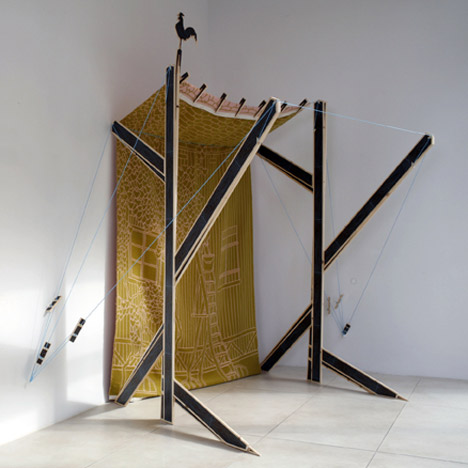Blankets hang from wooden frames to represent a rural village in this installation at Helmrinderknecht gallery in Berlin by Dutch designers Studio Makkink & Bey.
Called WashHouse, the mohair blankets feature drawings of brickwork, roofing, wooden buildings, vegetable patches, animals and transport.
They have been pegged over wooden frames as though visitors are walking through a series of washing lines or a drawn village.
The show continues until 30 October 2010.
The information that follows is from the gallery:
WashHouse
In Dutch design studio Makkink & Bey (Rianne Makkink & Jurgen Bey)’s world, design is a narrative based process. For their frst solo exhibition at HELMRINDERKNECHT contemporary design gallery, Studio Makkink & Bey has created a site-specifc walk through the three dimensional landscape of a rural village.
Mohair woollen blankets hanging on a clothesline give shape to the space and divide it. Individually woven patterns and lines become a house’s exterior walls or refect the imagery of the surrounding landscape.
The washing line is draped in between simple wooden posts. Although these posts function as a laundry rack within the space, within the fictive landscape they become trees.
Renowned for continually questioning the role of industrial design in our society, Makkink & Bey approach contemporary questions about the cross-disciplinary feld with innovative solutions.
This analytical approach is the basis for their design methodology that not only values beauty, but as well strives towards the continuous development of alternative means of dealing with space, the environment and our resources. Makkink & Bey’s new and visionary work is characterised by its focus on traditional craftsmanship and the use of environmentally conscious resources.
The installation, “WashHouse” traces our sensual and experiential perception of private and public spaces. Private space is determined by walls and other extreme demarcations. It is therefore protected and cared for by the individual. Public space is moulded by the responsible cooperation between individuals and groups.
It is open, without boundaries and based on the principle of collective participation. Woollen blankets are the design objects through which space is defned, with inner and outer mirroring one another. Like houses, woollen blankets offer human beings protection and shelter. Taking care of warmth and security, they are roofs over our heads and tuck us comfortably in. Both roof and blanket make private, protected moments possible.
Studio Makkink & Bey’s woollen blankets can simultaneously stage very private, intimate scenes as well as create vast public spaces. The border between private and public becomes blurred. Mohair is used to represent its softness and permeability. But “WashHouse” reaches as well into another level: by employing clothesline to hang the blankets, the association of cleanliness and freshness arise, for which the individual is responsible in both private and public space.
The woollen blankets were produced at the Textielmuseum’s workshop, Textilelab, in Tilburg, Netherlands. All blankets are two sided and woven with two different colours. There are a total of fve patterns. Each woollen blanket is unique and exlusively available at HELMRINDERKNECHT contemporary design. Measurements: 160x250m. Material: Mohair (goat hair)
Jurgen Bey (*1965) is one of the Netherlands best known designers. He and the architect Rianne Makkink (*1964), founded Studio Makkink & Bey in 2002. Makkink & Bey produce work in the felds of industrial design, exhibition design, installations in public space and applied arts. Jurgen Bey teaches at the Royal College of Art in London and was named Director of the Sandberg Institute in Amsterdam in 2010.
We are grateful to the Embassy of The Kingdom of the Netherlands for their kind support of the exhibition.
See also:
.
| Repacked by Studio Makkink & Bey |
Work Sofa by Studio Makkink & Bey |
House of Furniture Parts by Studio Makkink & Bey |

